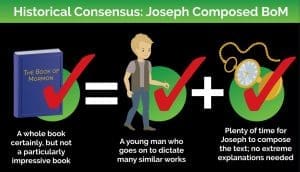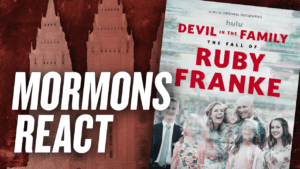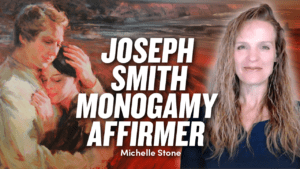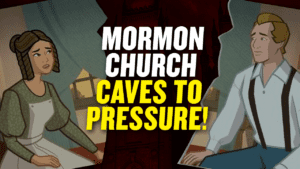 Join us now for this Mormon Stories Podcast episode, where historian John Hamer offers his theory as to how the Book of Mormon was created. These episodes are best seen as a continuation of our discussion from earlier this year wherein John Hamer provides a 19th Century context for The Book of Mormon.
Join us now for this Mormon Stories Podcast episode, where historian John Hamer offers his theory as to how the Book of Mormon was created. These episodes are best seen as a continuation of our discussion from earlier this year wherein John Hamer provides a 19th Century context for The Book of Mormon.
John Hamer graciously created a number of slides that give important visual cues to his research.
___________________________________
Part 1:
Part 2:
Part 1
Part 2
John Hamer is no stranger to Mormon Stories Podcast. Past episodes including contributions from John may be found here:
- 116-117: John Hamer – The LDS Succession Crisis of 1844 and the Beginnings of the RLDS Church to the Community of Christ
- 422-423: John Hamer on Returning to Mormonism Through the Community of Christ
- 503: Discussing the New LDS.org Polygamy Essays Part 1 — With Lindsay Hansen Park, John Hamer and J. Nelson-Seawright
- 526-527: John Hamer on Community of Christ as a Church Home for Transitioning Mormons
- 612-613: Reviewing 2015 with J. Nelson Seawright, John Hamer, Jamie Hanis-Handy, and Marisa Calderwood
- 796-797: LDS Church Purchases Printer’s Manuscript of Book of Mormon for $35M and BYU Now Serves Coke
- 1008-1009: Folk Magic, Joseph Smith, and Mormon Origins with John Hamer
- 1063-1065: The Book of Mormon’s 19th Century Context – John Hamer
___________________________________




17 Responses
How do we KNOW that Joseph Smith Sr’s dreams preceded the publication of the Book of Mormon? Is there evidence they were discussed before Lucy mentioned them decades later? Bushman suggests that Lucy herself may have fabricated aspects of the dream to parallel Lehi’s dream in 1 Nephi 8 in order to bolster the status of her husband and make him more like Lehi as the predecessor and father of Nephi/Joseph Jr.
As John Hamer points out oral dictation only seems impressive to us because we’ve never trained ourselves. A 45 year old blind friend is dictating her novel. She’s been at it for about two months and plans to submit the last part of her 400 or so pages to her editor next week. She works on it from 8am until noon five or six days a week. I’ve read parts.. like many books it’s much better written than the BoM. She’s a riveting storyteller by the way..
John Hamer is excellent!
What about the influence of The Late War and Captain Kidd’s adventures on the content and style of writing of the book of mormon?
This podcast makes it very difficult to distinguish between opinion and referenced fact. Podcasts make it very easy to state an opinion as fact because words float by quickly and the opportunity to ponder them and read references and other sources does not exist. If this podcast truly wishes to be fair and honest, they need to hold themselves to the same standard they hold The Church of Jesus Christ of Latter-day Saints. All podcasts need to be transcribed and cross referenced.
Great work John. I think the presentation could have been much shorter, especially for this audience but a good introduction this aspect of BoM authorship.
My thoughts…
Why is it assumed if the Book of Mormon was based on Manuscript Found that anyone other than Sidney Rigdon and Joseph had to be involved? Why does the conspiracy have to involve John Whitmer and others? Could Sidney and Joseph have kept the authorship secret to themselves? I think this is a plausible option.
I agree 100%, the wider the conspiracy theory, the less likely it is to be true but limiting the conspiracy to two people is reasonable to me.
Also, why limit the basis of BoM to Manuscript Found? Rigdon and Joseph could have gotten influence from multiple sources. I think most people would agree this is likely given all of texts on the topic extant at this time. I think there is basis for a spectrum of sources and scenarios involving Joseph and Sydney. On one end Joseph being influenced by Sydney all the way to Sidney being the primary author. I can see Joseph and Sydney having discussions about the source of the native Americans and various texts of the day on that subject and those discusssions could have included Manuscript Found.
Ignoring Manuscript Found means that all of the affidavits of all of the wittnesses need to be explained away. It is entirely possible of course that Hurlbut lead all of his witnesses to believe a false memory.
Joseph writing the BoM on his own is the tidiest solution and certainly satisfies Occam’s Razor but is not the only plausible option.
Justin,
Occam’s Razor is a great problem solving tool but when I think of various conspiracies and plots, especially political “gates”, they often involved multiple individuals out of necessity. Granted they’re just shows, but think of Ozark or Breaking Bad where their efforts to pull off a crime/fraud often required others involvement or inadvertently exposed their machinations to others which then required complex wrangling to contain.
I am also a proponent of the Spalding-Rigdon theory as it seems to bring together seemingly unrelated data points, like changes in certain revelations when comparing BC and D&C. I think Cowdery was likely involved, even perhaps Emma and some Whitmers. Also that the Book of Mormon was born from multiple source texts. I see Manuscript Found, or even Manuscript Story as a rough backbone, add in some Late War, First Book of Napoleon, maybe View of the Hebrews, and lastly some error prone KJV Isaiah, Malachi, and Matthew and you have yourself a Book of Mormon.
I disagree vehemently with your graphic that the Book of Mormon is not very impressive. It is extremely impressive. You couldn’t write the likes of it in a short amount of time it a long amount of time. Just because you hate everything related to The Church of Jesus Christ of Latter Day Saints doesn’t give you the right to disrespect something so very important to millions of people. You are, of course, entitled to your own opinion. As am I. My comment is given with love and respect.
There are LDS scholars who would dispassionately disagree with your assessment that the Book of Mormon is extremely impressive. Elder B. H. Roberts is the first name to present itself to my recollection:
“In the first place there is a certain lack of perspective in the things the book relates as history that points quite clearly to an underdeveloped mind as their origin. The narrative proceeds in characteristic disregard of conditions necessary to its reasonableness, as if it were a tale told by a child, with utter disregard for consistency.” —Studies of the Book of Mormon, p. 251
Can you speak to or explain the supposedly important “Discovery” of Chiasmus in the BoM and how JS could have known to use it…?
Mormons have this impression that “chiasmus” is a Hebrew thing. It’s actually a Greek word like anastrophe or syllepsis that are used to describe literary and poetic forms that are commonly used in poetry, whether it is Hebrew, Greek, Latin, French, or English. Chiasmus is a regular form in English poetry, an example would be “The Lamb” by Joseph Smith’s contemporary, William Blake.
Joseph Smith wouldn’t have known the word chiasmus. To the extent that chiasms exist in the Book of Mormon, I think these are sign of its oral composition. In composing stories aloud orally, Joseph was relying on the storyteller’s art which includes different sorts of repetition and circling back to what you were originally talking about. This happens less in written composition where a person is working from a logical outline.
The more extreme chiasms that people create for the Book of Mormon are largely the invention of the people making the ABCDEFGHGFEDCBA charts. Generally if you look at the original text, lines are omitted and it turns out that D doesn’t line up with D at all, nor F with F, so the apparent complexity is actually an illusion.
What Hamer said about history and theology is confused and is in need of cleanup by someone who knows the philosophical underpinnings of language. What if God- hypothetically- actually did exist? And what if God- hypothetically- wanted to produce something like the Book of Mormon? I think the evidence indicates that the Book of Mormon is a fiction, produced in a 19th century context. But that’s because it’s what seems to be true based on my reasoned evaluation of the evidence. People who say things like “a miracle, by definition, is the least probable event” are completely missing the point of what definitions are about. Words are meant to signify the concept or thing that the person speaking or writing wishes signified. You can define the word “miracle” as “apple pie” for all I care. The question isn’t about what concepts we associate with a given set of letters, but the internal quality of that concept which is signified and its coherence (or lack thereof) with the evidence. That is *not* what religious folk, including Mormons, mean by miracle. If you think that a divine act *is* the most improbable option in any given set of circumstances, that’s fine- but your argument must be predicated on the intrinsic character of the concept of divine activity. For example, perhaps there is something about what a person means by “divine” that renders it incompatible with what we mean by “action” and “in history.” If that is the case, the argument will be based on the nature of the concepts and not an attempt to define one’s way to victory. I could define John Hamer as “a big liberal liar” and insist that this definition holds true because that’s what I mean by these particular sets of letters/sounds. But such a definition would lack connection with the living, breathing, thinking human being named John Hamer- and it’s the concrete world which we are talking about, not the network of signs and symbols that we call language.
Theology, yes, is the consideration of God and divine activity. And history can mean a number of related things. We could, for example, mean “the practice of investigation what happened in the past.” In this case, we’re talking about a methodology- a methodology which was not engraved on gold plates from Heaven, but which might be subject to correction, critique, and improvement. Or, we might be talking about “what happened in the past” as in “Joseph Smith was born in the 19th century.” That happened *in history* and we can learn it *using history* but this sentence uses history in two distinct ways. If our method is sound, then if the Book of Mormon was produced naturalistically, we will learn that by historical investigation. But when we learn what we learn, it won’t be because someone decided that any explanations involving divine activity are out of order because it violates some unwritten rule whose actual legitimacy and logical foundation remains unknown and unstated. It will be because the methodology reliably correlates with the knowledge of reality. All disciplines, if they touch on matters of truth- whether that be necessary truths like mathematical reality or contingent, particular truths like the structure of an atom or Joseph Smith’s birthday- are connected with each other. Any argument based on reifying a wall between two disciplines is a very poor argument *unless* that wall has logical justification from the nature of the concepts.
All of that said, thanks for the podcast. I am a believer (though not in Mormonism) who will have disagreements with some of the things said, but this remains the preeminent podcast for academic investigation of Mormons, Mormon history, and Mormon scripture.
In part 2 it was mentioned that David Whitmer said that the priesthood ordination never happened. What is the reference for that? I want to look that up and read more about it .
I’m confused because John Hamer is a pastor for the Community of Christ church, which believes the BOM is divine scripture. so..?????? so confused!
THE TESTIMONY OF THREE WITNESSES
Be it known unto all nations, kindreds, tongues, and people, unto whom this work shall come: That we, through the grace of God the Father, and our Lord Jesus Christ, have seen the plates which contain this record, which is a record of the people of Nephi, and also of the Lamanites, their brethren, and also of the people of Jared, who came from the tower of which hath been spoken. And we also know that they have been translated by the gift and power of God, for his voice hath declared it unto us; wherefore we know of a surety that the work is true. And we also testify that we have seen the engravings which are upon the plates; and they have been shown unto us by the power of God, and not of man. And we declare with words of soberness, that an angel of God came down from heaven, and he brought and laid before our eyes, that we beheld and saw the plates, and the engravings thereon; and we know that it is by the grace of God the Father, and our Lord Jesus Christ, that we beheld and bear record that these things are true. And it is marvelous in our eyes. Nevertheless, the voice of the Lord commanded us that we should bear record of it; wherefore, to be obedient unto the commandments of God, we bear testimony of these things. And we know that if we are faithful in Christ, we shall rid our garments of the blood of all men, and be found spotless before the judgment-seat of Christ, and shall dwell with him eternally in the heavens. And the honor be to the Father, and to the Son, and to the Holy Ghost, which is one God. Amen.
Oliver Cowdery
David Whitmer
Martin Harris
Yes, David Whitmer wrote the history of the Church and exposed a lot of what Joseph Smith was lying about and hiding. Martin Harris was also a witness for other supposedly ancient texts of more than one break-off movement of the Church, which he never recanted.
What does that say about him?
3 Behold, I would exhort you that when ye shall read these things, if it be wisdom in God that ye should read them, that ye would remember how amerciful the Lord hath been unto the children of men, from the creation of Adam even down until the time that ye shall receive these things, and bponder it in your chearts.
4 And when ye shall receive these things, I would exhort you that ye would ask God, the Eternal Father, in the name of Christ, if these things are not true; and if ye shall ask with a sincere heart, with real intent, having faith in Christ, he will manifest the truth of it unto you, by the power of the Holy Ghost.
5 And by the power of the Holy Ghost ye may know the truth of all things.
Thanks for sharing! Most of our readers/viewers are VERY familiar with these verses.
But did you know that ANY belief, no matter how provably wrong or evil can be “strongly felt” to be true via feelings? Perhaps there is a better metric than feelings to know what is really true?
What do you think?